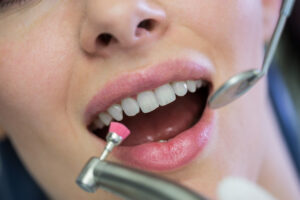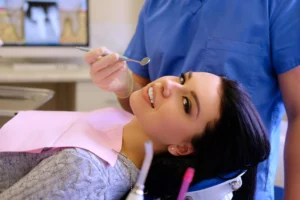Are you among the many who suffer from Temporomandibular Joint (TMJ) disorders? Typing “TMJ specialist near me” into the nearest search engine? You’re not alone. These conditions can cause considerable discomfort, including jaw pain, headaches, and difficulty chewing, among other symptoms. The good news is that there are treatment options available, and you may not need to resort to surgery. In this blog post, we’ll discuss the possibility of non-surgical TMJ treatment options, and how you can find a qualified TMJ specialist near you at Dr Finkelstein Dental.
Understanding TMJ Disorders
Before diving into non-surgical treatments, it’s essential to understand what TMJ disorders are. The temporomandibular joint is the hinge that connects your jaw to the temporal bones of your skull, allowing you to open and close your mouth. When something goes awry with this joint, it can lead to a variety of issues collectively known as TMJ disorders.
Common symptoms of TMJ disorders include:
- Jaw pain or tenderness
- Headaches
- Clicking or popping sounds when opening or closing your mouth
- Difficulty chewing
- Locking of the jaw
- Ear pain or pressure
These symptoms can be caused by various factors, such as stress, teeth grinding, an uneven bite, or even arthritis. The treatment approach will depend on the underlying cause and the severity of your condition.
Non-Surgical TMJ Treatment
The good news is that many individuals with TMJ disorders can find relief through non-surgical treatment options. Here are some of the most common approaches:
- Lifestyle Modifications:
- Stress Management: Stress is a significant contributor to TMJ disorders. Techniques like yoga, meditation, and relaxation exercises can help alleviate stress and reduce its impact on your jaw.
- Diet Modification: Avoiding hard or chewy foods can help ease the strain on your jaw. Opt for a softer diet and cut down on excessive chewing.
- Oral Appliances:
- Splints or Mouthguards: Dentists can create custom-fitted mouthguards or splints to be worn at night to prevent teeth grinding and provide relief for TMJ pain.
- Orthodontic Treatment: If an improper bite is causing your TMJ disorder, orthodontic treatments like braces may be recommended to correct your bite alignment.
- Physical Therapy:
- Jaw exercises and stretches can help improve the strength and flexibility of your jaw muscles, reducing pain and tension.
- Medications:
- Over-the-counter pain relievers, muscle relaxants, and anti-inflammatory drugs can be used to manage pain and inflammation associated with TMJ disorders.
Conclusion
Non-surgical TMJ treatment options are available for those suffering from TMJ disorders. These treatments can provide significant relief from the pain and discomfort associated with these conditions. Lifestyle modifications, oral appliances, physical therapy, and medications are all viable approaches to manage TMJ disorders without resorting to surgery.
If you’ve been searching “TMJ specialist near me”, consider Dr Finkelstein Dental. He has the expertise and experience to diagnose and treat TMJ disorders effectively, offering you a path to a pain-free and improved quality of life.
Remember, you don’t have to live with the discomfort of TMJ disorders. Seek help from a qualified dentist, explore non-surgical treatment options, and take the first step towards a happier, healthier smile.





